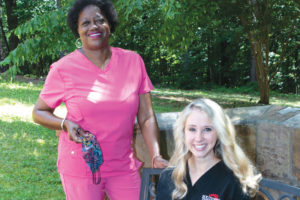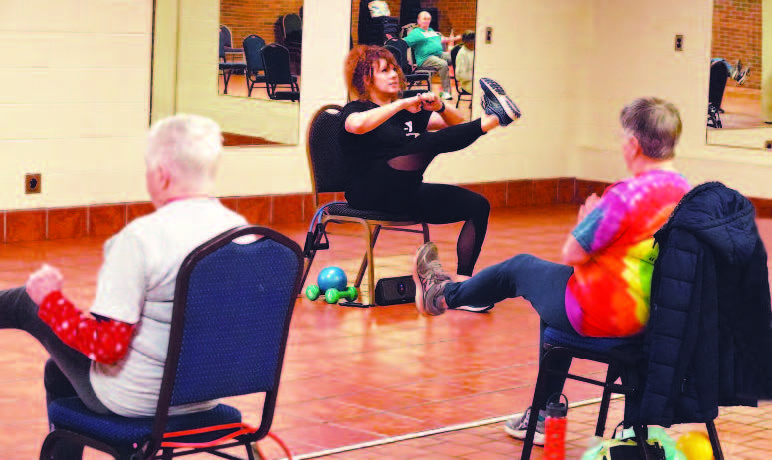Linda Stephens, 62, began caregiving at an early age in the tiny town of Siloam in Greene County. As a child, she took care of her grandmother while her mother was doing domestic work.
 “She wanted me to be in nursing,” Stephens recalls. Her grandmother lived to be 107 and during her last years Stephens learned to give her baths, feed her, and generally take care of what, in the profession, is called Activities of Daily Living (ADLs).
“She wanted me to be in nursing,” Stephens recalls. Her grandmother lived to be 107 and during her last years Stephens learned to give her baths, feed her, and generally take care of what, in the profession, is called Activities of Daily Living (ADLs).
Following certification as a nursing assistant (CNA) at Athens Technical College, Stephens worked fulltime in the personal care industry until she had three aneurysms on the job in 2008, requiring a stay at Emory Hospital in Atlanta, and eventual implantation of a pacemaker.
She worked for two more years but her doctor advised slowing down so in 2010 she began working part-time as a companion for residents at Talmadge Terrace. She was staying with a 92-year-old woman when the pandemic struck in March.
Lauren Wassell, is a personal care assistant (PCA) at Southern Companions. She started working with the company in the middle of the pandemic, and yes, she had “qualms.” Wassell had already been hired by the company but waited to begin work until things calmed down. Her first assignment has been assisting a gentleman at Highland Hills Assisted Living where she feels comfortable with their protective protocols such as temperature checks. She wears a mask and gloves provided by her employer although typically the client would provide any personal protective equipment.
“It’s a challenge wearing a mask with seniors who have hearing issues,” says Wassel. He often asks if she can take it off because he says he can’t process her words as quickly without seeing her mouth.
Figuring it out
Southern Companions employs 100 caregivers to provide private-duty home care to the elderly and post-operative patients in 23 counties in the northeast region.
“We are feeling our way through this,” says owner Allen Jernigan. “We thought it would be over in a few weeks.” Initially, the company had to scramble to get enough personal protective equipment (PPE) since hospitals and nursing homes had top priority for gloves, masks, sanitizer, etc. Jernigan received some from the state department of health, but otherwise, the company had to be creative, scoring some off Amazon and a contact at a janitorial supply company.
 Despite a few families of new clients deciding to postpone home care, the company’s business is up 40 percent because others decided to temporarily return to their homes from assisted living facilities. Luckily, only one of his schedulers working remotely, came down with the virus.
Despite a few families of new clients deciding to postpone home care, the company’s business is up 40 percent because others decided to temporarily return to their homes from assisted living facilities. Luckily, only one of his schedulers working remotely, came down with the virus.
Jacob Buffington, owner of a local Visiting Angels franchise, recalls that no one, even at the corporate office, was prepared for all the changes the virus would impose on process and procedures.
“We had hand sanitizers and gloves but we needed more face masks,” so in the beginning Buffington relied on social media to get the word out about the shortage. That resulted in a hundred being donated by a local hospice and a few more from the area aging agency.
With 80+ employees, no one has tested positive, and Buffington hasn’t encountered anyone in the client population that got infected.
“We’ve always had Universal Precautions (for infection control), but now we’re even stricter,” with extra steps such as requiring assistants to wear masks and wipe door handles. “Business fell off initially with seniors and their families pausing but it’s picking back up.”
As an older African American with health issues, Stephens is very much in the vulnerable population that has been affected and suffered the most with coronavirus. Still, she has continued to work, feeling confident in the measures Wesley Woods has taken, which range from a no-visitor policy and thermometer checks at the entrance to meal delivery to each room. She herself wears a mask regularly at work and elsewhere, and changes clothes at the facility.
A dedicated church member of Mt. Pleasant Baptist Church, she says “I put it in God’s hands.”![]()




